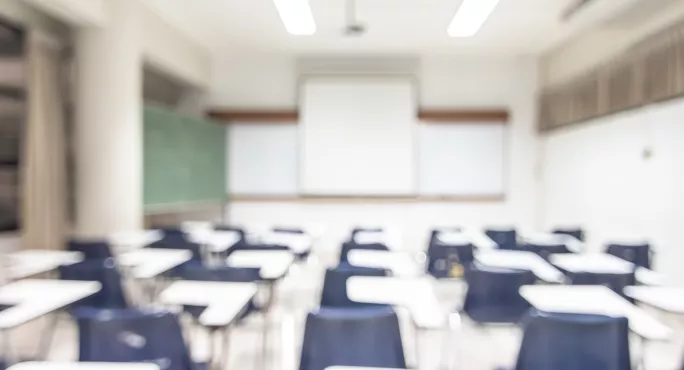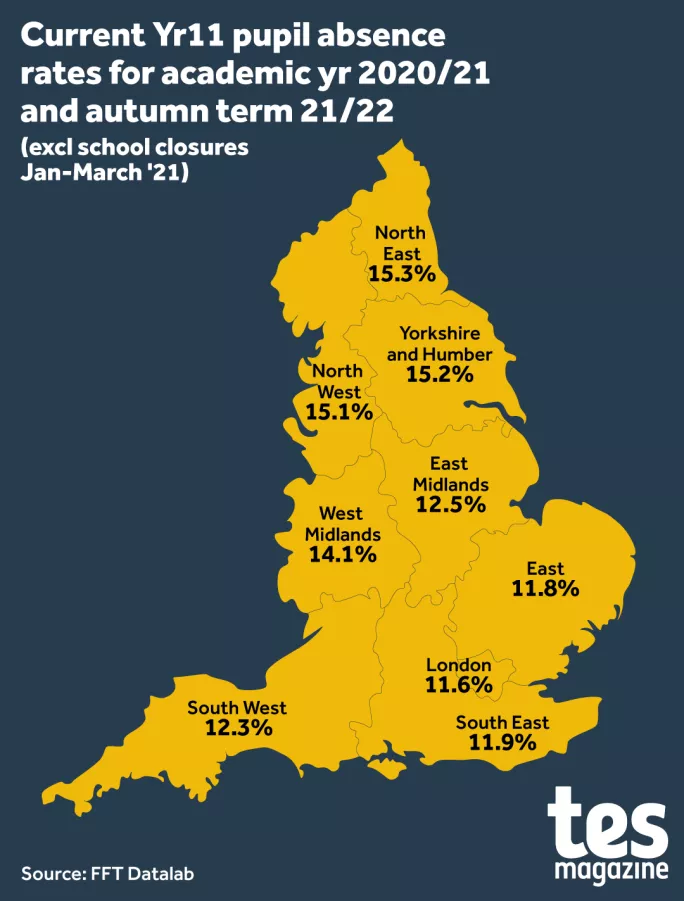Poorer GCSE students have missed 8 weeks of school

Disadvantaged students due to sit GCSEs this summer have missed an average of eight weeks of school since they started Year 10 in autumn 2020 - on top of the two months they were learning remotely when schools were closed in early 2021, new data reveals.
The data shows that, overall, current Year 11s have been absent from classrooms for an average of five and a half weeks on top of the two months of school closures since September 2020.
And just over one in seven students on free school meals (FSM) have been off school for a whole term, according to the data collated by FFT Education Datalab.
- Autumn 2021: Over a third of secondary students persistently absent
- Ofsted: Pupil absence a ‘stubborn concern’, Ofsted warns
- GCSEs: Exam ‘nervousness’ as Year 11s top Covid absence rates
The figures, seen by Tes ahead of publication today, have been described by school and education leaders as “extremely worrying” and have prompted a call for the government to consider targeting financial support at students who have missed the most school.
The data reveals that just last term Year 11s missed a total of 11.4 per cent of sessions, which are equal to half a day of schooling - almost double the rate for 2019 (6.5 per cent).
The new data comes after Tes reported that Year 11s had missed more sessions than any other year group last term.
The figures also lay bare the wide regional variation in absence rates for the current GCSE exam cohort. Year 11 students in the northern regions missed around 15 per cent of school sessions, compared with around 11 per cent in the South.
Meanwhile, an absence rate of over 20 per cent was recorded at 6 per cent of schools.

The data shows that more than one in seven (16.3 per cent) of disadvantaged students have missed almost a third (at least 30 per cent) of sessions since they started Year 10 in September 2020, the equivalent of a full term, compared with 4.6 per cent of their peers.
Covid absence: Disadvantaged GCSE students worst hit
Overall, students on free school meals missed 18.5 per cent of sessions, equivalent to around eight weeks of school (excluding last year’s lockdown periods of online learning).
Only just under a third (32.8 per cent) of disadvantaged students missed less than 10 per cent of sessions.
FFT said that the “vast majority” of disadvantaged students had higher absence rates than other pupils at the same schools.
The student absence rate in the North East, North West and Yorkshire and the Humber regions was over 15 per cent.
They were closely followed by the West Midlands (14 per cent).
Comparatively, the rate was lower in London (11.6 per cent) and at almost 12 per cent in the East.
The data was collated from the whole of Year 10 to the end of the autumn term of Year 11, from around 2,600 secondary schools.
GCSE exams are currently expected to go ahead this year, with some exam topics being released next month. However, Ofqual has said it will pitch grade boundaries at a midway point between the pre-pandemic levels of 2019 and teacher-assessed results in 2021.
Call for targeted funding
Jon Andrews, head of analysis and director of school system and performance at the Education Policy Institute (EPI) think tank, said it was “particularly worrying” to see “crucial exam-year” students missing out on so much in-person learning, adding that the government should “consider whether it needs to target additional financial support to pupils who have been out of school the most”.
“Our research has shown an association between pupil absence and higher learning losses, so the high rate of pupils out of school seen in this data release is a concern. It is particularly worrying to see pupils in such a crucial exam year missing out on so much in-person learning,” he said.
“We have found that pupils from parts of the North and Midlands, as well as those from disadvantaged backgrounds, have suffered the greatest attainment losses over the course of the pandemic. The rates of absence seen in the data today for these pupil groups may well be one of the drivers of these uneven learning losses.
“The government must continue to closely follow pupil absences this term and consider whether it needs to target additional financial support to pupils who have been out of school the most. It must also keep its approach to summer exams under review, and ensure that the adjustments in place for pupils are a proportionate response to the disruption they’ve faced.”
Geoff Barton, general secretary of the Association of School and College Leaders, said the data was “extremely worrying”, and that “varying levels of disruption....makes it difficult to establish a level playing field”.
“Once again, we can clearly see that the greatest impact has been on disadvantaged pupils...We can also clearly see that the impact is not uniform across the country, with some regions hit worse than others. It will undoubtedly be the case that there is also great variability on a more localised level and between schools,” he added.
“All of this presents an extremely challenging situation, particularly as these pupils are due to take GCSEs and other qualifications this summer, and they have obviously suffered varying degrees of disruption, which makes it difficult to establish a level playing field.”
Mr Barton continued: “We know that schools and colleges are working very hard to support their students and to ensure they are as well prepared for exams as possible.”
An Ofqual spokesperson said a package of “unprecedented support” had been put in place for students taking GCSEs and A level this summer.
“It would not be fair to give more support to some students than others because of where they live or their backgrounds as individual students’ experiences will have differed, within a region and whatever their background.
“The advance information will cover over 300 exam specifications, giving a sense of its breadth. This approach followed a consultation and we are confident that this will support all students.”
A DfE spokesperson said: “Exams are the best and fairest form of assessment, and we fully intend for them to take place this summer, with adaptations to recognise the impact of the pandemic on students’ learning.
“These adaptations mean students will get advance information of the focus of exams in most subjects, choices of topics or content in other subjects, and formulae and equation sheets in some GCSE maths and science exams.”
You need a Tes subscription to read this article
Subscribe now to read this article and get other subscriber-only content:
- Unlimited access to all Tes magazine content
- Exclusive subscriber-only stories
- Award-winning email newsletters
Already a subscriber? Log in
You need a subscription to read this article
Subscribe now to read this article and get other subscriber-only content, including:
- Unlimited access to all Tes magazine content
- Exclusive subscriber-only stories
- Award-winning email newsletters
topics in this article



